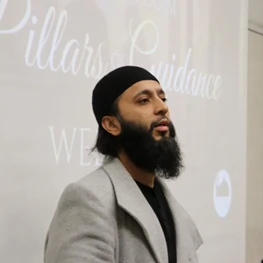Fiqh of Ibaadah
Department: Islamic Studies
Program & Code: Islamic Studies(IBA101)
Credits: 2
About this Course
Fiqh of Ibaadah is a comprehensive introduction to the foundational rulings of worship in Islam, based on the Hanbali school of thought. Using the classical Arabic primer Bidayah al-‘Abid by Shaykh ‘Abd al-Rahman al-Ba’li, students will explore essential acts of worship including purification (taharah), prayer (salah), fasting (sawm), charity (zakat), pilgrimage (hajj), and more.
While the text is in Arabic, all instruction and commentary will be delivered in English, making this an ideal gateway for students to begin their journey through traditional Islamic scholarship while accessing original sources. The course reflects the authentic seminary model—structured, rigorous, and spiritually enriching.
What You Will Learn (Learning Outcomes)
- Master the foundational rulings related to personal worship in the Hanbali madhhab.
- Build a practical understanding of purification and prayer from a classical legal perspective.
- Engage with original Arabic texts while benefiting from English explanations and commentary.
- Experience the blend of traditional Islamic pedagogy and academic evaluation.
- Lay a strong groundwork for further study in the Islamic sciences, especially advanced fiqh.
Learning Format & Assessment
This is an interactive, instructor-led course with weekly live sessions and reading assignments. Evaluation will be based on:
- Participation & Attendance: 10%
- Weekly Quizzes & Assignments: 30%
- Final Exam: 60%
Students are expected to review notes weekly, complete assigned readings, and participate in discussions and in-class reviews.
Why This Course Matters
In a time where legal knowledge is often fragmented or superficial, Fiqh of Ibaadah reconnects students with the scholarly tradition that guided generations of Muslims. By mastering the essentials of worship, students not only fulfill personal obligations but also prepare themselves to contribute meaningfully to their communities.
Whether you aim to become a student of knowledge, strengthen your own practice, or eventually teach others, Fiqh of Ibaadah is your first step into a lifelong journey of understanding the Deen.
Course breakdown
12 Weekly Topics
Introduction & Overview of Purification
- Course orientation
- Types of water & their rulings
Istinja, Istijmar & Hygiene
- Rulings on cleaning oneself with water or stones
- Mannerisms in using the restroom
- Personal hygiene and siwak
The Fitra & Wudu
- Natural acts (sunan al-fitrah)
- Steps and conditions of wudu
Wiping Over Barriers
- Wiping over khuf, casts, turbans, and hijabs
Ghusl & Nullifiers
- What breaks wudu
- Actions requiring Ghusl (Ritual Bath)
- Obligations and methods of ghusl
Tayammum & Impurities
- Dry ablution: when and how
- Overview of physical impurities (najasah)
Removing Impurities & Women's Rulings
- Methods of removal
- Menstrual & postpartum rulings
Beginning Salah (Prayer)
- Who prayer is obligatory upon
- Adhan, iqamah, and prerequisites of prayer
Core Elements of Salah
- Pillars, obligations, and recommended actions in prayer
Special Rulings in Salah
- Sujood as-sahw (prostration for forgetfulness)
- Recommended prayers
Voluntary prayers & Timings
- Nafl prayers and forbidden times for prayer
Congregational Prayer
- Importance and rulings
- Preview of topics in Fiqh II: Jumu’ah, Eid, travel, and prayer in fear
Instructors

Sh. Shavkat Sayed
Sheikh Mehmet Usta, a visionary leader at the helm of the i3 Institute, brings over two decades of experience in Islamic education and corporate leadership to inspire and empower young Muslims across North America
